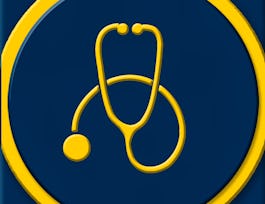Kidney transplantation is a major advance of modern medicine which provides high-quality of life for patients with end-stage renal disease. What used to be an experimental, risky, and very limited treatment option more than 50 years ago is now routinely performed in many countries worldwide. The number of renal transplants is expected to rise sharply in the next decade since the proportion of patients with end stage renal disease is increasing.



Clinical Kidney, Pancreas and Islet Transplantation



Instructors: Marlies Reinders
21,249 already enrolled
(362 reviews)
Details to know

Add to your LinkedIn profile
13 assignments
See how employees at top companies are mastering in-demand skills


Earn a career certificate
Add this credential to your LinkedIn profile, resume, or CV
Share it on social media and in your performance review

There are 6 modules in this course
Great that you are joining us! In this course you will learn about clinical kidney, pancreas and islet transplantation and its challenges. Before you start with studying we invite you first go through our introduction module and introduce yourself in the forum to meet your fellow learners. If you encounter any difficulties while studying, please let us know in the forum. For technical difficulties or questions regarding the course certificate, you can always contact the Coursera Learner Helpdesk. Good luck & we hope you enjoy studying in this course!
What's included
2 videos4 readings1 discussion prompt1 plugin
Welcome to this first module of the course! We will answer important questions before transplantation. These include: why is transplantation the preferred option for patients with end stage renal disease? What are the immunological barriers for transplantation? And what are the selection criteria before transplantation? Unique 3D movies about the different immunological tests will help you to understand the concepts. There are also optional lectures, including a fascinating movie about the Eurotransplant allocation system and patient/donor interviews. At the end of the module we will link the contents you have learned to clinical patient cases, patient - donor interviews and a quiz. You can find each other on the discussion forum. With the e-tivities you can apply your knowledge. In the honors lessons more in depth immunological testing and pre transplant screening can be obtained. The lesson also includes peer reviews about important preclinical questions. Have fun and good luck with the first module!
What's included
11 videos4 readings2 assignments1 peer review3 discussion prompts
Now you know the factors of importance before transplantation, including the immunological barriers and important aspects for patient selection, we can focus on challenged patient groups and on surgical procedures. What does a kidney, pancreas and islet transplantation surgical procedure look like? What is important? And what are the key aspects in elderly patients, patients with diabetes and immunological challenged patients. We have unique visulisations, 360 virtual reality videos and a game about a patient case. Advanced readings will invite you to look at the different subjects in more depth. At the end of the module there are interviews about a patient with diabetes and the transplant recipient and donor to illustrate the impact of life. You can discuss patient cases on the forum together with your peers. In the honors lesson you can apply knowledge about more in depth immunological, surgical and metabolic challenges and living kidney donation. Let’s start and we hope you will enjoy this module.
What's included
14 videos7 readings2 assignments1 peer review3 discussion prompts2 plugins
You are now familiar with the basic knowledge about challenges in transplant recipients and the surgical transplant procedures. Once the transplantation has been successful, it doesn’t mean everything is stable. What are actually the graft survival data? Which challenges do we face in the first months? How can we tackle these challenges? 3D movies about early surgical challenges and about the targets for immunosuppressives, including cell therapy, will help you to understand the concepts. In addition, we invite you to master the advanced knowledge and to give your opinion in the patient cases in the forum. There is also a serious game about a patient case. Can you solve the challenges? And can you think of a scenario for the game and help us with building? We will make a game of the best scenario, which will be incorporated in the course. In the honors lesson you can learn in more detail about immunological concepts, including the complement system. A patient case will help to show you the importance of this knowledge. Good luck with this module and happy learning!
What's included
12 videos9 readings2 assignments1 peer review4 discussion prompts
Now you’ve learned about the challenges in the early period after transplantation. But what about the late period? What is the long term patient and allograft survival? Have we improved in the last decades? What are the main causes for morbidity and mortality? And can we reach tolerance in the future? We invite you to give your opinion in the patient cases and to discuss it on the forum. There are also advanced readings to look at additional subjects, including recurrence of the kidney disease after transplantation, the organization of dermatological care for the transplant recipient and the role of the patient himself in the whole process. The interview about tolerance gives you insight why pregnancy is of interest to understand the concept of tolerance and which steps have been made from lab research to a clinical protocol. In the honors lesson late challenges will be discussed in more detail, with a focus on infections, recurrence of the kidney disease after transplantation and tolerance. Have fun and good luck with this last module.
What's included
12 videos5 readings5 assignments1 peer review4 discussion prompts
We hope you have enjoyed all the modules. Good luck with the final quiz! If you are interested in an intensive course about transplantation go to the course resources.
What's included
2 assignments
Instructors



Recommended if you're interested in Patient Care

University of Michigan

Imperial College London

Imperial College London
Why people choose Coursera for their career




Learner reviews
Showing 3 of 362
362 reviews
- 5 stars
84.06%
- 4 stars
13.73%
- 3 stars
1.92%
- 2 stars
0.27%
- 1 star
0%
New to Patient Care? Start here.

Open new doors with Coursera Plus
Unlimited access to 7,000+ world-class courses, hands-on projects, and job-ready certificate programs - all included in your subscription
Advance your career with an online degree
Earn a degree from world-class universities - 100% online
Join over 3,400 global companies that choose Coursera for Business
Upskill your employees to excel in the digital economy
Frequently asked questions
Continuing Medical Education (CME) consists of educational activities that aim to maintain, develop, or increase the knowledge, skills, and professional performance in order to maintain competence and learn about new and developing areas of the medical field. Content for these programs is developed, reviewed, and delivered by faculty who are experts in their individual clinical areas. In various countries, a certain amount of CME-credit hours must be obtained by medical professionals to maintain their licenses.
For this course it is possible to obtain 5, 9 or 13 CME credit points. For more information on how to obtain these points we like to refer to the "Additional introduction for obtaining CME credit" module in week 1 of the course
Yes, if you have already done the course previously and obtained the Coursera official Course Certificate as proof we encourage you to apply for the CME credits. You can obtain 5 or 9 CME as follows:
1. Sign up for the course at “Boerhaave Continuous Medical Education” (https://www.boerhaavecontinuousmedicaleducation.com/)
2. Upload your Verified Certificate from Coursera (without honors 5 CME or with honors 9 CME). Pay the contribution according to “Boerhaave Continuous Medical Education." They will provide you with the instructions and add the CME credits to GAIA (Dutch participants) and/or provide you with a CME certificate (international participants)
Access to lectures and assignments depends on your type of enrollment. If you take a course in audit mode, you will be able to see most course materials for free. To access graded assignments and to earn a Certificate, you will need to purchase the Certificate experience, during or after your audit. If you don't see the audit option:
The course may not offer an audit option. You can try a Free Trial instead, or apply for Financial Aid.
The course may offer 'Full Course, No Certificate' instead. This option lets you see all course materials, submit required assessments, and get a final grade. This also means that you will not be able to purchase a Certificate experience.














